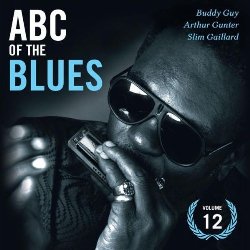ABC of the Blues CD12 (2010)
ABC of the Blues CD12 (2010)

CD 12 - Buddy Guy, Arthur Gunter & Slim Gaillard 12-01 Buddy Guy – Try to Quit You, Baby play 12-02 Buddy Guy – You Sure Can’t Do 12-03 Buddy Guy – This Is the End 12-04 Buddy Guy – Sit and Cry (The Blues) 12-05 Arthur Gunter – Baby Let’s Play House 12-06 Arthur Gunter – No Naggin’, No Draggin’ 12-07 Arthur Gunter – Honey Babe 12-08 Arthur Gunter – Little Blues Jeans Woman 12-09 Arthur Gunter – Baby You Better Listen 12-10 Arthur Gunter – I Want Her Back 12-11 Arthur Gunter – Crazy Me 12-12 Arthur Gunter – Ludella 12-13 Arthur Gunter – Blues After Hours 12-14 Slim Gaillard – Walkin’ & Cookin’ Blues 12-15 Slim Gaillard – Blue Heaven 12-16 Slim Gaillard – Thunderbird play 12-17 Slim Gaillard – Chicken Rhythm 12-18 Slim Gaillard – I Love You 12-19 Slim Gaillard – I Don’t Stand a Ghost of a Chance with You 12-20 Slim Gaillard – Don’t Blame Me
George "Buddy" Guy (born July 30, 1936) is an American blues and jazz guitarist and singer. He is a critically acclaimed artist who has established himself as a pioneer of the Chicago blues sound, and has served as an influence to some of the most notable musicians of his generation. Guy is known, too, for his showmanship on stage, playing his guitar with drumsticks, or strolling into the audience while playing solos.
He was ranked thirtieth in Rolling Stone magazine's list of the "100 Greatest Guitarists of All Time". His song "Stone Crazy" was ranked seventy-eighth in list of the 100 Greatest Guitar Songs of All Time also of Rolling Stone.
While Buddy Guy's music is often labeled Chicago blues, his style is unique and separate. His music can vary from the most traditional, deepest blues to a creative, unpredictable and radical gumbo of the blues, avant rock, soul and free jazz that morphs at each night’s performance.
Arthur Gunter (May 23, 1926 – March 16, 1976) was an American blues guitarist and musician. He was best known for his song "Baby Let's Play House", which was later a hit single for Elvis Presley.
Gunter was born in Nashville, Tennessee, a musician from an early age; as a child, he was in a gospel group with his brothers and cousins called the Gunter Brothers Quartet. In the early 1950s he played in various blues groups around Nashville, and began recording for Excello Records in 1954.
In November 1954, Gunter recorded "Baby Let's Play House" for Excello (2047), which became a local hit. It became nationally known later that year when Elvis Presley recorded a version for Sun Records. "Elvis got that number and made it famous. But I didn't get a chance to shake his hand," Gunter would later say. His first royalty check, received that same year, was for $6500.
Gunter continued to record for Excello until 1961. His regular band broke up in 1966 and he moved to Pontiac, Michigan, performing only occasionally thereafter.
Bulee "Slim" Gaillard (January 4, 1916 – February 26, 1991) was an American jazz and blues singer, songwriter, pianist, and guitarist, noted for his vocalese singing and word play in a language he called "Vout".
Gaillard first rose to prominence in the late 1930s as part of Slim & Slam, a jazz novelty act he formed with bassist Slam Stewart. Gaillard's appeal was similar to Cab Calloway and Louis Jordan in that he presented a hip style with broad appeal. Unlike them, he was a master improviser whose stream of consciousness vocals ranged far afield from the original lyrics along with wild interpolations of nonsense syllables like MacVoutie O-reeney. One such performance is celebrated in the 1957 novel On the Road by Jack Kerouac.
In the late forties and early fifties, Gaillard frequently opened at Birdland for such greats as Charlie Parker, Flip Phillips, and Coleman Hawkins. His 1945 session with Parker and Dizzy Gillespie is notable, both musically and for its relaxed convivial air. Gaillard could play several instruments, and always managed to turn the performance from hip jazz to comedy: he would play the guitar with his left hand fretting from the top of the neck, or would play credible piano solos with his palms facing up.
Last Updated (Saturday, 21 January 2012 22:43)








